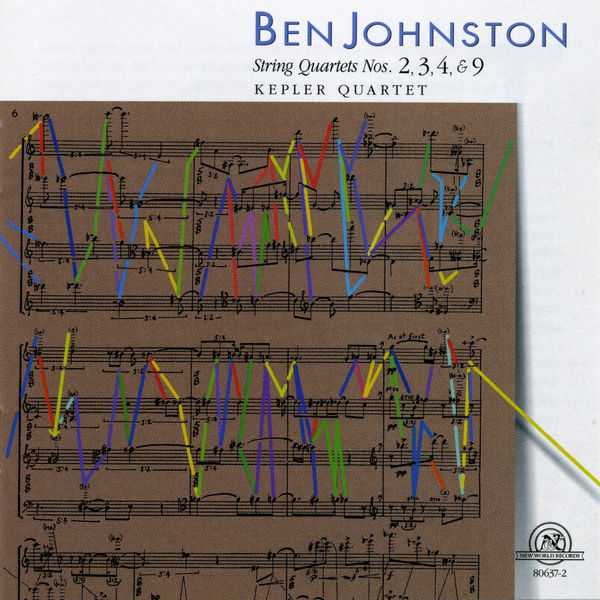
Composer: Ben Johnston
Performer: Kepler Quartet
Format: FLAC (tracks)
Label: New World
Catalogue: NW80637
Release: 2006
Size: 314 MB
Recovery: +3%
Scan: cover
String Quartet No. 9
01. Strong, Calm, Slow
02. Fast, Elated
03. Slow, Expressive
04. Vigorous And Defiant
Crossings
05. Verging, String Quartet No. 3
06. The Silence
07. The Ascent, String Quartet No. 4, Amazing Grace
String Quartet No. 2
08. Light And Quick: With Grace And Humor
09. Intimate, Spacious
10. Extremely Minute And Intense; Not Fast
Ben Johnston’s (b. 1926) music has reached a wide and diverse audience, both at home and abroad, without compromising its high seriousness or its depth of philosophic purpose. His music shows the confluence of several traditions of music-making that have flourished within the United States. In the 1950s his output was characterized by the neoclassicism of his teacher Darius Milhaud. In the 1960s he explored serial techniques and, at the end of the decade, indeterminacy. From 1960 onward the overriding technical preoccupation of his music has been its use of just intonation, the tuning system of the music of ancient cultures as well as that of many living traditions worldwide. Johnston is a pioneer in the use of microtones and non-tempered tuning, rationalizing and going beyond Harry Partch’s achievements in this domain.
His ten string quartets are among the most fascinating collections of work ever produced by an American composer. And yet, like similarly imposing peaks in the American musical landscape-Ives’s Universe Symphony, for example, or the Studies for Player Piano of Conlon Nancarrow-these works have, for decades now, remained more known about than known, more talked about than played. All the quartets have been performed in public (with one exception, the immensely difficult String Quartet No. 7), but only four have previously been recorded. The scores have been analyzed by musicologists and theorists fascinated by their fusion of advanced compositional techniques (serialism with just intonation, for example; microtonality with a kind of neoclassical revisionism), but they have been too little heard. The Kepler Quartet’s recordings-this disc is the first of a series of three, prepared with Johnston’s active support and supervision-offer lively and scrupulously accurate readings that unlock the door to these marvelous pieces. Like Ives and Nancarrow before him, there is the sense that Johnston’s time has finally come.
Connoisseurs of American chamber music may already know of Ben Johnston’s inventive and witty string quartets, but find their absence on CD quite perplexing. This is music of great integrity, startling vitality, and striking originality, yet it is virtually unknown outside the cult following that has appreciated these ingenious compositions in live performances. Fortunately, the Kepler Quartet has begun recording the cycle of Johnston’s 10 string quartets for New World Records, to be issued in three volumes; if this first installment gives any indication of things to come, the whole set will be essential for all of Johnston’s admirers to know and own. A cross between homespun American populism and the sophisticated experimentation of the avant-garde, Johnston’s music follows in the iconoclastic tradition of Ives, Partch, and Cage, but with its own frank expression, exuberance, and wayward charm; yet it is also accessible to the casual listener in the directness of its material and the clarity of its techniques, no matter how dense the textures or peculiar the tunings may be. The bracing counterpoint, bright diatonic clusters, and expressive microtonality of the String Quartet No. 9 (1988) make it the most immediately appealing selection of the disc, followed in attractive folksiness and quirky moods by the String Quartet No. 3 (1966) and the String Quartet No. 4, “Amazing Grace” (1973), eccentrically grouped together here with a silent track under the heading Crossings. Listeners who like fiercer music may prefer the thornier String Quartet No. 2 (1964), a dense work with gritty dissonances and twisting chromatic lines that sound astonishing in “just” intonation. Taken altogether, the four works on this disc provide a clear outline of Johnston’s intriguing methods and brash style; and the Kepler Quartet is so compelling in its performances that these vibrant recordings, supervised by the composer, should be regarded as authoritative. New World’s reproduction is clear and crisp in all details, but invitingly resonant and warm as well.